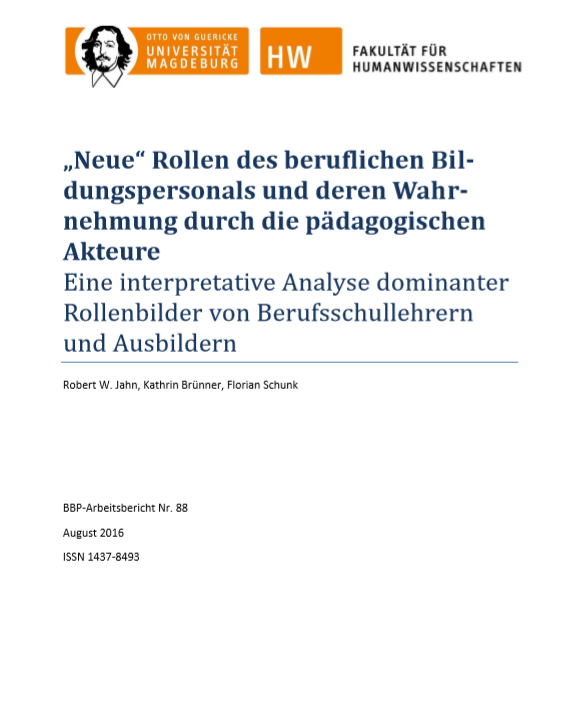"Neue" Rollen des beruflichen Bildungspersonals und deren Wahrnehmung durch die pädagogischen Akteure
Eine interpretative Analyse dominanter Rollenbilder von Berufsschullehrern und Ausbildern
DOI:
https://doi.org/10.24352/UB.OVGU-2021-091Keywords:
Bildung, ErziehungAbstract
“New” roles of vocational educating personnel and their perception by educational actors. An interpretative analysis of dominating role models among vocational teachers and trainers. This report discusses the roles of vocational teachers and trainers. In contrast to the normative-theoretical perspective which focuses on demands for an new role of vocational teachers and trainers based on structional functionalism, there is also an interactional perspective. The interactional perspective asking whether educational actors of vocational training perceive the various expectations imposed on themselves and how they use them to readjust their own role. Particularly with regard to vocational trainers is this question nearly unacknowledged yet. Beside this lack of research, it is of interest to compare vocational teachers and trainers as organizational and qualifying parameters differ considerably. Therefore, we will reconstruct the roles of four vocational trainers and four teachers on the basis of an explorative qualitative study using a reconstructive resp. interpretive analysis method. With respect to the perceived role expectations the results show that imparting professional knowledge is fundamental to educational work. Moreover, there is neither indication of “old”/”traditional”, or “new”/”modern” roles nor is it possible to extrapolate role models as onedimensional equivalents to specific expectations. Instead, our typecast distinguishs solely on the limitation resp. pluralism of perceived expectations. A so-called pluralistic role model as it is normative-theoretically postulated from a structural functionalistic perspective is only partly verifiable. Furthermore, there are indications that neither function nor qualification or organizational context as solely influence role construction, but rather that interaction of all examined factors against the biographical background forms individual characteristics of the educational role with regard to a plural/limited profile.
Downloads
Published
Issue
Section
License
Copyright (c) 2019 BBP-Arbeitsbericht

This work is licensed under a Creative Commons Attribution-ShareAlike 4.0 International License.

